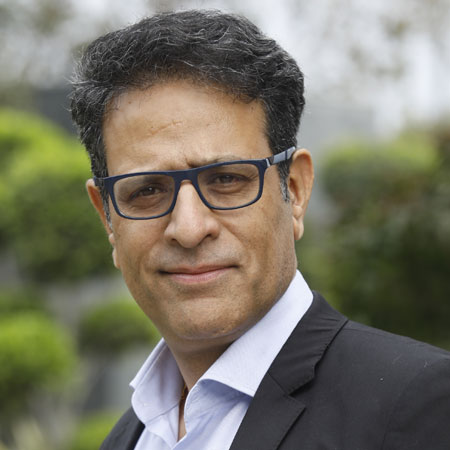Bikesh Ogra, MD & CEO, Jakson Green
There is a need to accelerate energy deployment, enhance energy efficiency and increase green-finance to achieve SDG 7: Bikesh Ogra, MD & CEO, Jakson Green
Our aim is to contribute significantly to India’s energy independence, reduce carbon emissions and create a sustainable future: Bikesh Ogra, MD & CEO, Jakson Green

About The Episode
Welcome to the full Episode 17 of Sustainability Karma, India’s first and only talk show on sustainability on All India Radio.
In this episode of Sustainability Karma, Bikesh Ogra, MD & CEO, Jakson Green, talks about how Jackson Green is aiming to become India’s leading new energy transition platform.
Talking about the recent Union Budget, Ogra lauds it for maintaining continuity with previous policies, particularly regarding renewable energy initiatives like the PM Surya Ghar Muft Bijli Yojana and the Kusum scheme, which focus on solar rooftops for households and enhancing power supply to farmers, respectively.
Saying that one of the standout features of the budget was the announcement of the critical mineral mission, aimed at securing the essential minerals like lithium, cobalt, and nickel, which are crucial for renewable energy technologies, he adds the budget outlined a three-pronged strategy to enhance domestic production, access overseas assets, and promote recycling, which is seen as a strategic move to secure India’s energy future.
Another area of focus is the anticipated pump storage policy, which, while not yet fully rolled out, is expected to play a crucial role in integrating renewable energy into the grid and addressing the intermittency issues associated with sources like solar and wind. The emphasis on nuclear energy, particularly through the development of small modular reactors (SMRs), is expected to be a key element in India’s future energy mix, contributing to the vision of a Viksit Bharat or developed India, he adds.
However, the budget also fell short on certain fronts, Ogra points out. For example, there was a lack of a GST waiver on critical energy components like electricity, solar and wind energy systems, EV charging stations, and battery storage. Similarly, the reduction in capital goods for solar manufacturing, and the increase in duties on solar glasses and components for solar modules could negatively impact local manufacturing costs.
The budget also remains silent on the Inter-State Transmission System (ISTS) waiver beyond June 2025, leaving uncertainty in the sector. The financial health of distribution companies (discoms), a perennial issue, is another area where the budget fails to propose substantial solutions, which is concerning given the central role of discoms in the energy supply chain, he says.
When discussing immediate challenges, grid infrastructure and connectivity emerge as major concerns. The speaker emphasises the need for substantial improvements in this area, along with a more robust framework for green molecules like hydrogen and ammonia, which are critical for adopting greener fuels. The existing contracts for these green molecules need to be more robust to facilitate faster adoption of cleaner energy sources.
On the topic of Sustainable Development Goal 7 (SDG 7), which aims for affordable and clean energy for all by 2030, Ogra says that the current global pace, including India’s, is insufficient to meet the target. To accelerate progress, he suggests several measures, including increasing the adoption of solar rooftops and community solar projects, improving energy efficiency, investing in public transportation and smart grid technologies, subsidizing clean cooking fuels, and promoting rural electrification. There is also a call to focus on coal gasification, carbon capture, and the utilization and storage of emissions from coal-fired plants to minimize environmental impact.
Ogra says that compressed biogas is a crucial area where progress can be made by enhancing the availability of feedstock like agricultural waste, which could significantly reduce emissions.
Acknowledging that while India is on the right path, he adds achieving SDG 7 by 2030 will require more rigour and vigour in implementing these initiatives.
Talking about Jackson Green, Ogra says that it is only two year old, but is actively contributing to India’s national energy targets. The company has rapidly expanded its renewable energy portfolio, with over 5 gigawatts (GW) in renewable energy EPC projects and 1 GW of in-house assets are under development. Jackson Green is also making strides in the green molecule space, with projects focused on hydrogen and its derivatives like ethanol and methanol.
The company is building a robust ecosystem for green hydrogen, including an electrolyser manufacturing unit with a 300-megawatt (MW) capacity, and is actively participating in international forums like COPs and the G20 to advocate for global climate action. The company’s commitment to sustainability is further demonstrated by its IGBC-approved office building and its plans to develop the world’s first integrated platform for green hydrogen and its derivatives.
He says that the vision that drives Jackson Green is to be a leader in the transition to a cleaner, more resilient energy future, not just for India but on a global scale. The company aims to diversify its energy portfolio across solar, wind, storage, and hybrid energy solutions, and is also exploring waste-to-energy solutions, including converting agricultural and food waste into biogas.
Ogra adds, Jackson Green is leveraging its technological expertise to create a digitized energy transition platform that optimises renewable energy assets, both for its own use and for third-party asset owners. Through these strategic initiatives, Jackson Green aims to significantly contribute to India’s energy independence, reduce carbon emissions, and create a sustainable future for generations to come.

